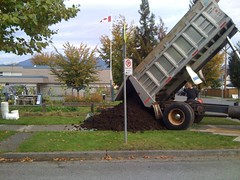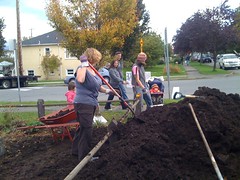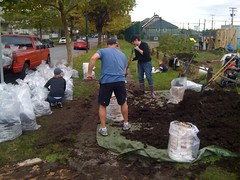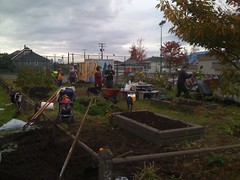
No Dark Sarcasm in the Classroom shared CC by Thomas Hawk
When I do my little talks on open education, I like to reference things like learning parties, maker culture, the kind of practical DIY education that is important enough to people that it happens whether it’s provided by an institution or not. I would like open educators to see people in the wider world not just as learners gratefully consuming our generously-provided open educational resources, but as partners in a broader cultural enterprise, and an invaluable source of untapped knowledge and expertise.
If I’m giving this talk at a university or at a typical educational conference, this part usually falls flat. Maybe it’s because I’m wrong, more likely I haven’t figured out how to make the case in an engaging way. I keep doing it anyway.
The classical definition of sustainable development is that we should use the global resources only so that the generation coming after us will [inherit] the planet in as good shape as it was when we were born. We got something from the earlier generations and should past it forward for our children and grant children.
…Social sustainability would mean that all people of the world would have basic living conditions: health, well-being, education, dignity and freedom to do sustainable choices. If you follow any world news you know that we are far from this.
Reaching cultural sustainability we are not doing much better than with the social sustainability. Cultural sustainable development would mean that we protect the cultural diversity of the world. All cultures should have a right to persist and develop. With the fact that humankind is losing a language every two weeks we are far from a cultural sustainability.
— Teemu Leinonen, Sustainable development and education in the digital age

C Concourse shops and restaurants, Portland International shared CC by kevincrumbs
“All culture is being sold down the river by the sorts of people who want to turn the entire planet into an international airport arrival concourse. That’s not the victory of somebody’s culture over another culture. That’s the victory of schlockmeisterism and crapola over good taste and good sense.”
— Terence McKenna

From the Bryan Alexander’s family blog, Scaling the Peak
That darkness is certainly part of our homesteading experience. Time and again we hear laments about lost practices, perished memories, techniques which must have been present but which nobody can grasp now. Setting foot on our land is sometimes an archaeological experience in all kinds of ways, including this one of recovering social memory.
This summer I spoke with a local senior about food and brine. We were both interested in the combination. He wasn’t thinking of brining food for taste and style, though, but about canning practices in the 1930s. He remembers that practice from his childhood, and hearing about it from older family members. I’m not sure how much practical detail he recalls.
The brilliant local contractor who has done so much great work for us often tells me about how much we don’t know about construction. Everything from planking to building sleds: how much do we not know, lost in the passage of only a few decades?

Photo by Sharon Kravitz
I think about the now-retired treeplanting contractor, who smiles in admiration when talking about the forestry students who interned on his projects every year, praising their scholarly knowledge, then noting that the forty years he’d spent in the trade gave him many practical tricks he could still teach them, things that would result in healthier and more viable forests. That resource is gone.
I admire the work of people here with the East Vancouver Garden Project (the source of Sharon Kravitz’s photos here), interviewing and documenting the urban farming that’s been done for decades here in my neighbourhood by people from diverse cultural backgrounds. Or the One Straw Live and Learn project connecting mentors with learners.

Chris giving Harry the news photo by Sharon Kravitz
Seems to me it’s not just aboriginal tribes in the rainforest who are seeing their cultures disappear. The airport-concourse homogeneity that McKenna bemoans is being imposed on the supposedly triumphant cultures as well, and the increasingly necessary wisdom of our own elders is fading into dim memories and following them into their graves.
Seems to me that the open web could be an ideal medium for identifying, researching, presenting, aggregating and globally connecting this imperiled knowledge. Call it digital storytelling, community service learning, student as producer, whatever…
Seems to me that sustaining the breadth of our culture, especially the elements that may prove necessary to our survival, should be part of any open educational mission worthy of a “movement”. I suspect it depends on a vision of higher education that is both more permeable and more humble than the one we are holding now.


















